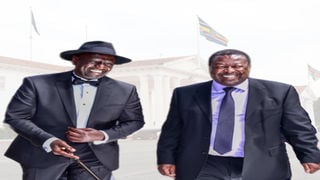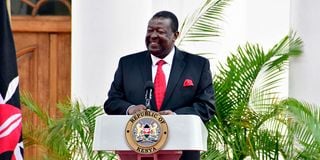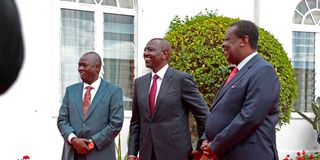
President William Ruto (left) with Prime Cabinet Secretary Musalia Mudavadi. By getting a substantive docket in the Wednesday reshuffle, Mudavadi now occupies a powerful position.
| PoolWeekly Review
Premium
Musalia Mudavadi: The rise of the phantom
What you need to know:
- Mudavadi is the most experienced in the government, having entered parliament in 1989.
- By getting a substantive docket in the Wednesday reshuffle, Mudavadi now occupies a powerful position, which makes him Kenya’s top diplomat. In practice, and by the size of his docket, he could eclipse DP Gachagua.
Unlike other boisterous Kenya Kwanza politicians, Prime Cabinet Secretary Musalia Mudavadi is soft-spoken, mild-mannered, and calculates what he says on the podium.
Though a billionaire, Mudavadi doesn’t show off his wealth, and neither is flashy. During the vetting for his cabinet position, Mudavadi revealed another side that few Kenyans didn’t know: He was worth Sh4 billion.
When he played rugby for the University of Nairobi’s Mean Machine RFC, Mudavadi was nicknamed “Phantom” for his speed and skill – and in Kenyan politics, he may be the person to keep watching.
By getting a substantive docket in the Wednesday reshuffle, Mudavadi now occupies a powerful position, making him Kenya’s top diplomat. It was from that lofty position that the likes of Dr.
Njoroge Mungai, Kalonzo Musyoka, and Dr. Robert Ouko would ruffle feathers as they built their international profiles and dreamt of becoming president.
On paper, Mudavadi is the third most powerful person in the country. But it now appears that in practice, and by the size of his docket, he could eclipse Deputy President Rigathi Gachagua, who was tasked with leading coffee and tea reforms by President Ruto under Executive Order No. 1 of 2023.
Compared to the DP, Mudavadi is not a newcomer to politics and is the most experienced within the Kenya Kwanza government, having entered parliament in 1989 to succeed his father – Moses Budamba Mudavadi, who was then the Minister for Local Government and Physical Planning, in Moi’s government.
At 29, he was a Cabinet minister in President Moi’s government, and his career has ever since rotated around alliances, defeats, humiliations, retreats, and comebacks.
Before he joined the Ruto camp, Mudavadi’s Amani National Congress was confined to Western Kenya, dashing his hopes of ever constructing a national party. But Mudavadi is an experienced politico, having served Moi and Kibaki in senior cabinet positions.
For a short period, he served as Moi’s vice-president and later as Deputy Prime Minister in the Coalition government of President Kibaki and Raila Odinga.
He has also served as minister for Finance, taking Kenya through one of the economic nightmares of liberalisation.
He was also at the helm when the government of President Moi was under pressure from donors to adopt the Structural Adjustment Programs.

Prime Cabinet Secretary Musalia Mudavadi makes his address during the signing of Ministerial Performance Contracts for FY 2023/2024 officiated by President William Ruto at State House on August 1, 2023.
With a new docket in place, President Ruto appeared to be shielding Mudavadi’s political career after a lobby group moved to court seeking a declaration that the creation of the office of the Prime Cabinet Secretary was illegal and that its creation amounted to an amendment of the basic structure of the Executive.
The High Court declaration that the Chief Administrative Secretaries (CAS) position was unconstitutional appeared to have sent shivers to the Mudavadi camp since his position wasn’t provided for in the Constitution.
In the court papers, the lobby group, Operation Linda Jamii, argues that the creation of Mudavadi’s office had altered the basic structure by creating two principal assistants for the president contrary to Article 147 (1) of the Constitution.
It is a case that has excited the anti-Mudavadi camp within Kenya Kwanza, which has been relying on the outcome of the Kimani Ichung’wa-led National Dialogue Committee talks whose first task was entrenchment in the Constitution of the offices of the leader of the official opposition and that of that Prime Cabinet Secretary.
For that, the Bomas talks have been opposed by Deputy President Gachagua and his close allies, who have dismissed the talks as a waste of time. Among the most vocal is the Kiharu MP Ndindi Nyoro, who has asked the government to stop the Bomas talks, arguing that they don’t add value. More so, there have been adverse reports that the bi-partisan talks have become a gravy train for the members.
Deep divisions
The talks have, however, divided the Kenya Kwanza into two camps. Late last month, Mudavadi told a meeting in Nakuru that the government was in “full support” of the bipartisan talks, an indicator of the deep divisions over the issue. The Mudavadi camp argues that the talks will iron out some of the problems never resolved by the 2010 constitution. This appears to be an expanded mandate, and, interestingly, the talks have received various presentations that had featured in the collapsed Building Bridges Initiative (BBI) – the brainchild of former President Uhuru Kenyatta and his then political nemesis-turned ally, Raila Odinga.
The current talks were called after a series of protests over the rising cost of living, demands to audit the 2022 presidential election results, restructuring and reconstitution of the IEBC (Independent Electoral and Boundaries Commission), and measures to prevent interference with political parties. The president’s allies had pegged their conditions for dialogue on the protection of Mudavadi’s office, the two-third gender rule, and entrenchment of the Constituency Development Fund. They had also sought to create a constitutional office of the leader of the opposition.

President William Ruto (centre), Deputy President Rigathi Gachagua (left) and Prime Cabinet Secretary Musali Mudavadi at State House, Nairobi on July 12, 2023.
While the Bomas talks started on a low key, they are now being used to engineer local politics and have become a playground of various interests. Whether the Gachagua camp, given their opposition to it, will take any part remains to be seen. But if the talks are not scuttled, it will be a triumph for the Mudavadi camp, which will have the position of Prime Cabinet Secretary protected. Creating such an office would not require a referendum since it does not touch on the ten matters in Article 255(1) of the Constitution, which calls for a referendum. By getting the coveted Foreign and Diaspora Affairs docket, Mudavadi will be playing a crucial role in shaping Kenya’s foreign policy at a time when the Western powers are keen on having the country play a crucial role in African politics. More so, President Ruto has become a key ally of Washington, and thus, Mudavadi will be accompanying the president in his foreign travels or representing him.
President Ruto had been dispatching Mudavadi to represent him, which appeared to have irked the DP. In June this year, he remarked that he had left the foreign travel to Mudavadi – an issue that revealed the tensions between the two offices. Leaders from Western Kenya told off Gachagua after he remarked that “the only foreign trip I will attend is that which will bring development because I don’t have interest in attending swearing-in ceremonies… I have told the president to let me address this issue of alcohol and bhang…this is a major role and it’s better than travelling abroad more than 20 times”.
During the Kenya Kwanza campaigns, Dr Ruto had declared himself to be the kingpin of the populous Mount Kenya region. That appears to have shifted, and Gachagua now claims to have that slot as the most senior politician from the region. The rise of Mudavadi is to secure President Ruto yet another solid base in Western Kenya – just in case Mt Kenya ever walks away from him. Gachagua has made sure that he has brought the region’s politicians together by brokering a truce. Similarly, Mudavadi has been consolidating his power in Western Kenya.
There has been a call for him- and other Kenya Kwanza affiliates – to fold their parties and it will be interesting to see how Mudavadi will play those politics. Leading this campaign is UDA Secretary General Cleophas Malala, said to be an ally of the deputy president. With the UDA elections set for December, eyes will be on Mudavadi’s Amani National Congress, and if he moves to UDA, he will cause a tumult within the party ranks where the anti-Gachagua forces could lay a strategy to humble him at the delegates’ conference.
So far, the “Phantom” is going to give nightmares inside the government, for only President Ruto knows what strategies he has laid. At the moment, Mudavadi’s elevation has not been greeted with Jubilation in Gachagua’s backyard, which indicates that there will be more in-house fights. But so far, it is Mudavadi who has the ball.
[email protected] @johnkamau1





